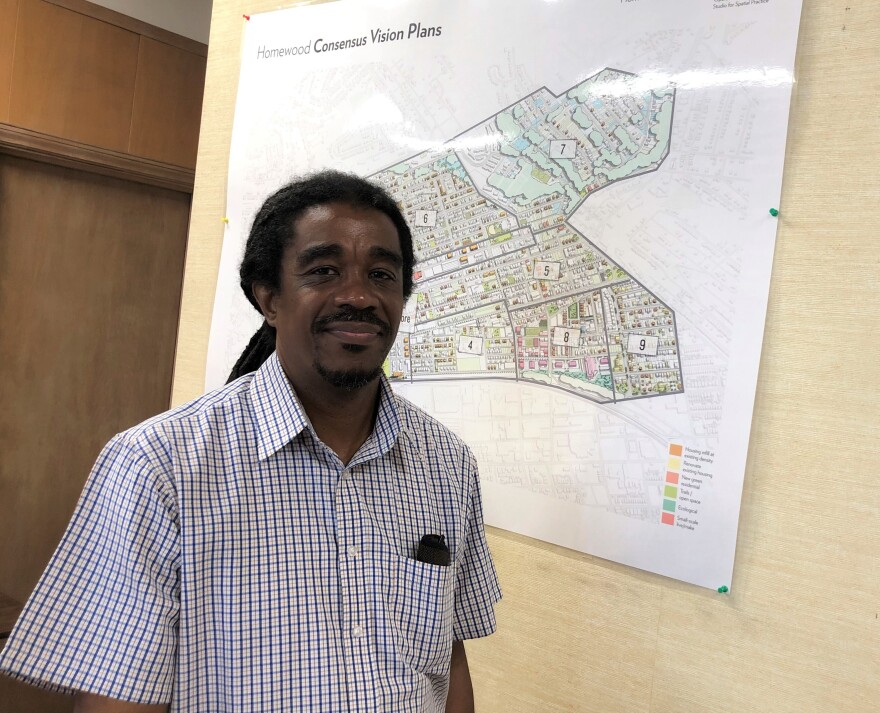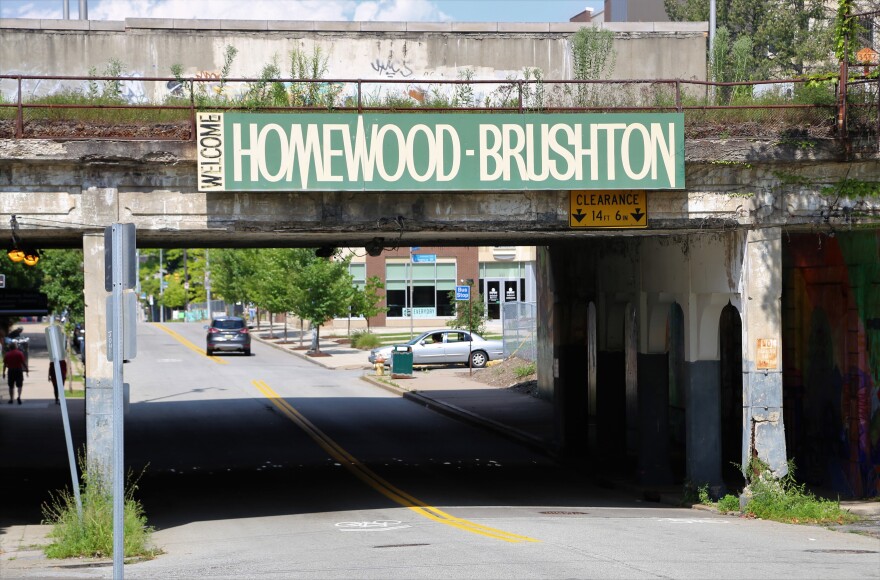Housing is a main priority for Homewood residents. In a city short 17,000 affordable units, neighborhood activists are acutely aware of the need for low-income housing options. But in many new buildings that accept federal subsidies, formerly incarcerated individuals are barred from renting.

Residents who have spent time in prison understand these challenges firsthand.
Doug Williams isn’t shy about his struggle with drugs, or the time he did as a result of it.
“My pastor always said it: You’ve gotta go through a test to have a testimony,” Williams said.
The Homewood native spent much of his early adulthood in and out of jail. He’s now considered a success story in the neighborhood: He went to rehab, got clean and turned his life around. Currently he’s the director of Homewood Community Sports, and a program coordinator at the Greater Pittsburgh YMCA, where he helps other young men returning from prison.
“A lot of them talk about transportation, a lot of them talk about employment,” Williams said. "But the majority talks about housing.”
In Pennsylvania,two out of every threepeople released from prison go back within three years. Access to stable and affordable housing reduces the risk of recidivism, according to nearly every study on the subject. When people are released from jail, they can live with family members, go into transitional housing or try to find a place of their own. But even when affordable housing options are available, they aren’t always open to formerly incarcerated tenants.

Allegheny County has a “housing first model,” which emphasizes that each resident should have somewhere to live, regardless of ability to pay or criminal record. Department of Health and Human Services Office of Community Services Assistant Deputy Director Cynthia Shields said a safety net of housing services are provided for people in the county, including short-term, long-term and permanent rental assistance. They work with case managers to make sure tenants are paying rent and following individual action plans, which could include requirements like going to anger therapy or staying sober. DHS works with about 30 organizations that connect individuals with records to apartments.
“But finding landlords that will rent to our programs is a challenge for us,” Shields said.
Some landlords don’t want to go through the county property inspection. Others stigmatize ex-offenders and worry how they might behave as tenants. To combat this stereotype and recruit more landlords, the county recently established a Housing Navigation Unit, which tries to encourage landlords to rent to those formerly incarcerated.
“They've actually been finding that a lot of it is really just sitting down with the landlords and talking to them and getting to know them,” Shields said.

'How can I get in them?'
On the corner of Hamilton and North Lang avenues, bulldozers screech near a line of tall, wood-framed homes. The structures are covered in green construction wrapping and white spray paint marks each unit number. Reverend Ricky Burgess, the city council member who represents Homewood, is proud of the 58-unit housing development.
“The goal is to take Homewood, which is a community of concentrated poverty, and transform it into a stable, mixed-income community,” Burgess said.
Tenants can apply to live here through the Housing Authority of the City of Pittsburgh. The smallest unit rents for $900 per month. Potential residents can apply for rental assistance through the Housing Choice Voucher program, or Section 8. But former offenders would be unlikely to find a home here. The Housing Authority has regulations that sharply limit access for ex-offenders. Applicants with records are often banned for several years from such assistance, or permanently ineligible.
Burgess said this project and others like it are directed at a larger population.

“The greatest need is affordable housing, period,” Burgess said. “Housing for people coming home for reintegration is a subsection of that need. It is not the biggest need, but is a need.”
He added that housing for women and children is a main priority for the community. During an April Homewood Community Development Collaborative meeting, neighborhood leaders discussed other upcoming projects, including four Habitat for Humanity homes on Bennett Street and 36 redevelopment units as part of the Susquehanna Homes Phase II project. Nearby in North Point Breeze, 125 new apartments and 25 town homes are expected in the Lexington Park development. The Pennsylvania Housing Finance Agencyannounced earlier this month that it would redevelop a three-story building at 627 N. Homewood Avenue, known as the Givner Building, and include six affordable rental units.
Burgess said Homewood residents are generally enthusiastic about the changes.
“My office gets five to ten phone calls a day about the new development,” Burgess said. “I’m stopped at the grocery store, everyday, and [people ask,] ‘How can I get in them? When are they going to open? How many units?’ … It’s an exciting time.”

Affordable, but not accessible
In a home-turned-office along Hamilton Avenue, Homewood resident and activist Cherylie Fuller projects her voice so she can be heard over the bulldozers across the street. Fuller, who ran against Burgess in the 2019 Democratic Primary, said Homewood is expecting an influxe of formerly incarcerated people in the coming years, and housing them hasn’t been a priority.
“No, it’s not … because we’re all talking about ‘affordable’ housing,” Fuller said. “If an individual is just coming home from incarceration, are they at that [place] where they can afford a $900 a month bedroom?”
That price tag would be steep for many residents of Homewood, where the median household income is $19,642. Formerly incarcerated tenants who can’t take advantage of housing-assistance programs must find willing private landlords.
“In a few places where we know that there are those type of housing, we don’t, sort of, broadcast it,” Fuller said. Residents in those units could be stigmatized or targeted, she said, and neighbors could be vulnerable, too.
Dwayne Drummond, a formerly incarcerated window installer, now lives in the neighborhood, but didn’t want to disclose where he stayed because he wasn’t on the lease due to his record.

“It’s my girl’s house and that’s the truth,” Drummond said. “You can’t get nothing in your name, you know what I mean? Because you want people to have reentry into society and you get blackballing from jobs, blackballing from housing.”
As Homewood prepares for major development, Fuller said it needs to consider people like Drummond. It’s the responsibility of this community, she said, to “put our arms around everybody.”
This story is Part 4 of a series exploring how Homewood, and residents who have spent time behind bars, are trying to rebuild after the War on Drugs.





